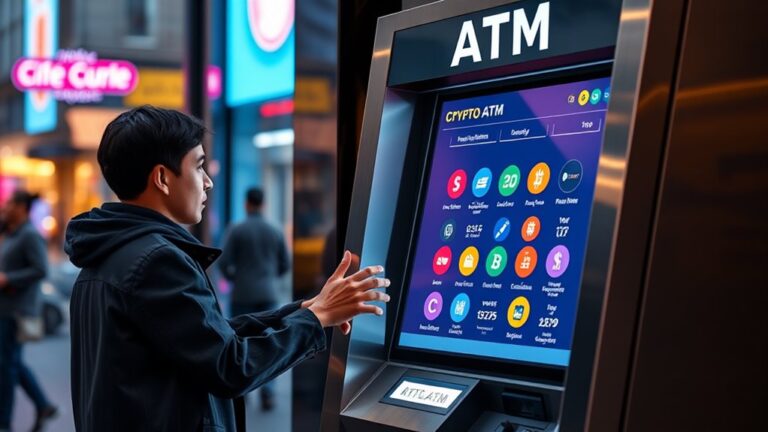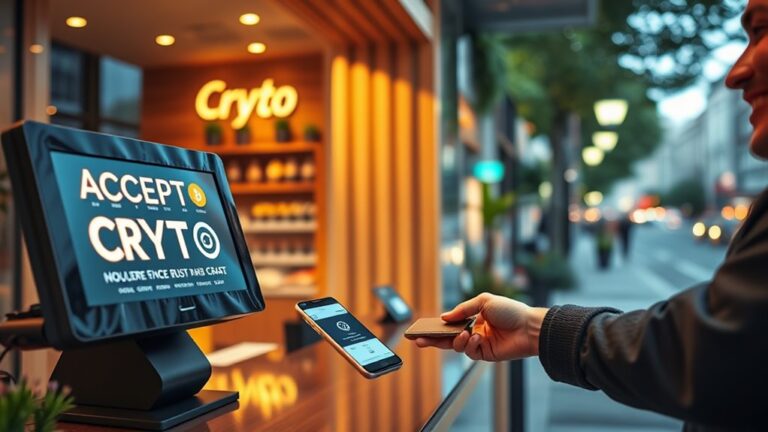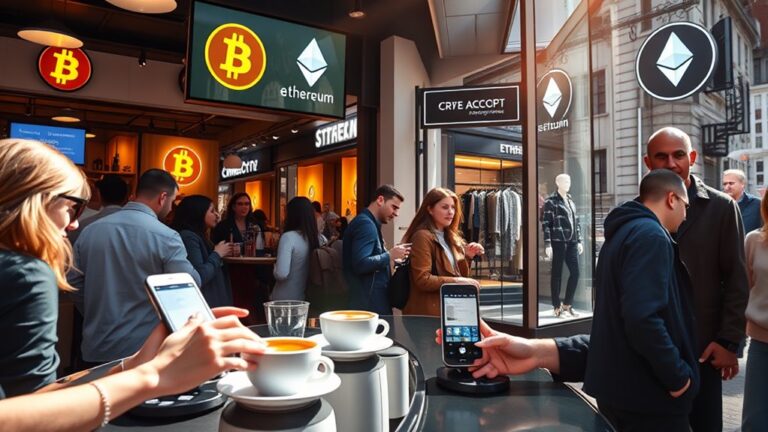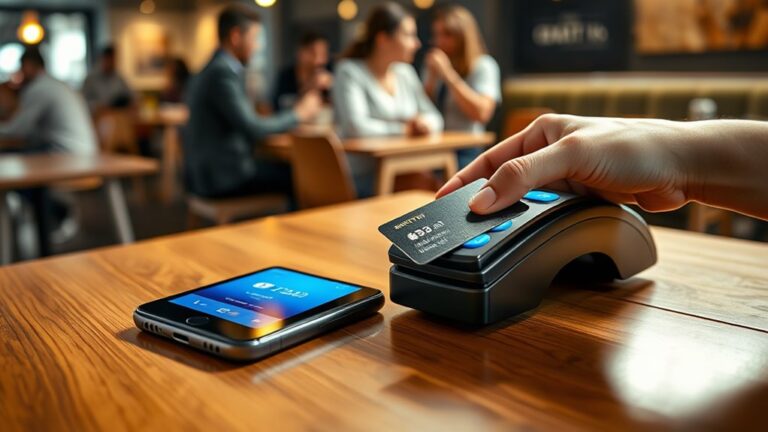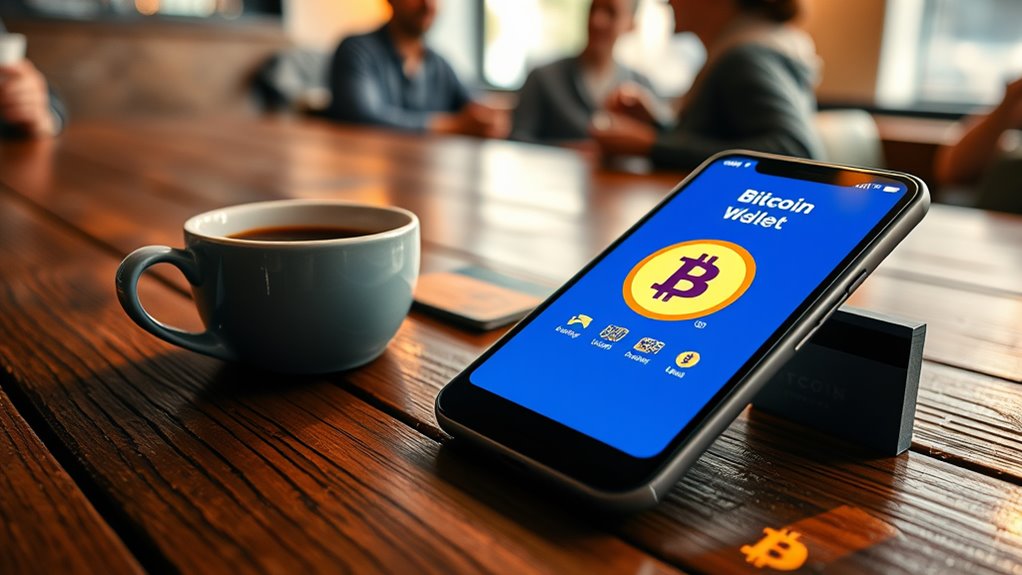
How to Use Bitcoin for Payments: A Step-by-Step Guide
To use Bitcoin for payments, start by selecting a suitable wallet, such as a hardware wallet for security or a mobile wallet for convenience. Next, acquire Bitcoin through an exchange or peer-to-peer platform. After setting up your wallet, you can make payments by choosing Bitcoin at checkout and confirming transaction details. Utilize services like BitPay for seamless transactions. When receiving payments, share your wallet address accurately. Further exploration will provide deeper insights into managing and tracking Bitcoin payments efficiently.
Key Takeaways
- Choose a reliable Bitcoin wallet that suits your security needs, such as a hardware wallet for long-term storage or a mobile wallet for convenience.
- Acquire Bitcoin through centralized exchanges, decentralized platforms, or peer-to-peer transactions, considering fees and security measures.
- Select Bitcoin as your payment method during checkout, ensuring you enter the correct wallet address to facilitate the transaction.
- Confirm the transaction details, be aware of any applicable fees, and utilize secure authentication measures like strong passwords and two-factor authentication.
- Track your transaction using a blockchain explorer to monitor its status and confirm completion after receiving the required number of confirmations.
Choosing the Right Bitcoin Wallet

When selecting a Bitcoin wallet, users must consider several key factors that influence both security and usability. Wallet types vary, with hardware wallets offering enhanced security by keeping private keys offline, while software wallets are more accessible but less secure due to their internet connection.
Desktop wallets provide better control over funds than web wallets, whereas mobile wallets enable convenience for on-the-go transactions. Users may also consider paper wallets, although they carry high risks if lost.
Additionally, security features like encryption, two-factor authentication, and multi-signature support are vital for safeguarding assets. A wallet’s user interface and compatibility across devices can greatly affect the overall experience, making careful selection essential for effective Bitcoin management. Ultimately, understanding how a crypto wallet operates is crucial for users to securely interact with the cryptocurrency ecosystem.
Acquiring Bitcoin for Transactions
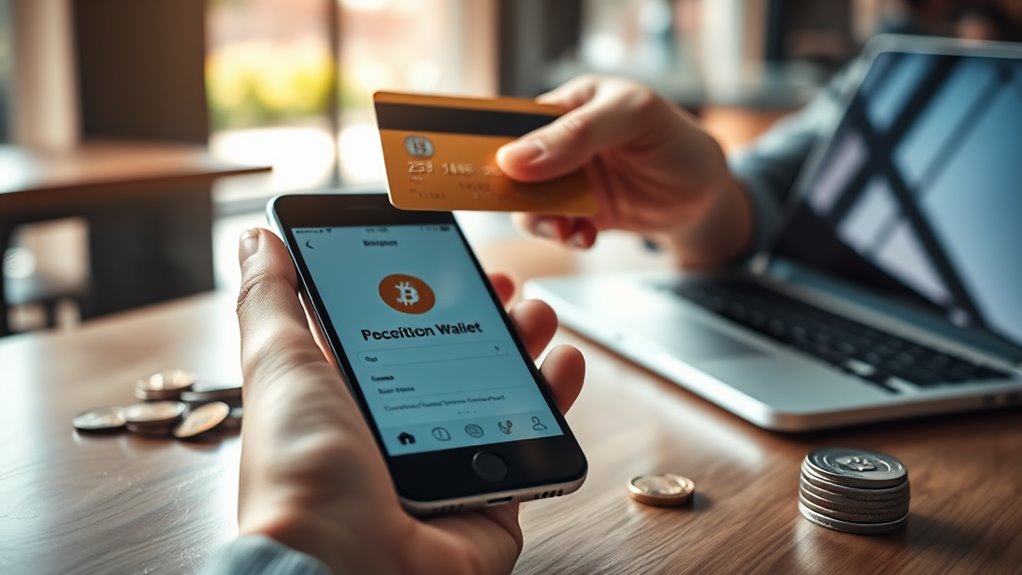
Acquiring Bitcoin for transactions involves understanding various methods and platforms available for buying this cryptocurrency. Users can choose from centralized exchanges, decentralized exchanges, peer-to-peer platforms, or payment processors. Each method has distinct characteristics, which can influence the purchasing process.
| Method | Description | Payment Options |
|---|---|---|
| Centralized Exchanges | Platforms like Coinbase and Binance | Bank transfers, credit cards |
| Decentralized Exchanges | Enable pseudonymous transactions | Cryptocurrency swaps |
| Peer-to-Peer Platforms | Connect buyers and sellers directly | Various methods |
| Payment Processors | Services like PayPal for purchases | Linked accounts/cards |
Factors such as transaction fees, regulatory considerations, and security measures must also be taken into account when acquiring Bitcoin. Understanding these aspects guarantees informed decisions when entering the cryptocurrency market. Additionally, selecting a secure exchange is crucial for ensuring the safety of your assets, especially when considering strong security measures that protect your investments.
Setting Up Your Wallet

When setting up a Bitcoin wallet, users should first understand the various types available, including software, hardware, paper, custodial wallets, and wallet extensions. The setup process involves account creation, generating a recovery phrase, and implementing security best practices, such as strong passwords and multi-factor authentication. Additionally, beginners should consider security features when selecting the right wallet for their needs.
Types of Wallets
Setting up a Bitcoin wallet is an essential step for anyone looking to engage in cryptocurrency transactions. There are several types of wallets available, each with unique features suited for different needs.
| Type of Wallet | Key Features |
|---|---|
| Hot Wallet | Convenient for frequent transactions, connected to the internet. |
| Cold Wallet | Greater security, kept offline. |
| Hardware Wallet | Specialized devices for secure storage. |
Desktop and mobile wallets are also options; desktop wallets store private keys on a computer, while mobile wallets are designed for easy transactions on mobile devices. Understanding the various wallet types helps users choose the right one based on their security and convenience preferences. Additionally, selecting a reliable payment platform is crucial for ensuring secure and efficient transactions.
Wallet Setup Process
A successful wallet setup process is essential for anyone looking to use Bitcoin effectively. The initial steps include selecting a reputable software wallet, such as Electrum or Exodus. Users should download the wallet app from official sources to guarantee security.
The setup process typically involves the following key steps:
- Account Creation: Provide basic information and set a strong password.
- Recovery Phrase: Record and secure the recovery phrase for wallet recovery.
- Verification: Complete identity verification if required by the wallet.
- Public and Private Keys: Understand their roles in transactions.
- Backup: Regularly backup wallet data to prevent loss.
Additionally, it is important to choose a wallet that offers user-friendly interfaces to enhance your overall experience with Bitcoin transactions.
Security Best Practices
Security best practices are essential components of setting up a Bitcoin wallet successfully. Users should first choose a secure wallet type, such as a cold wallet for long-term storage or a hardware wallet for maximum security.
Implementing secure authentication measures, like two-factor authentication (2FA) and strong passwords, is important. Managing private keys and backups is another critical step; private keys should be stored offline, and seed phrases kept secure.
Additionally, users should avoid public Wi-Fi and regularly update their wallet software. Adopting advanced security measures, such as multi-signature wallets for transactions, can further enhance protection. Ensuring that private keys have secure backups stored in multiple locations is crucial to safeguarding your Bitcoin assets.
Staying informed about current security threats also helps users safeguard their Bitcoin assets effectively.
Making Online Payments With Bitcoin
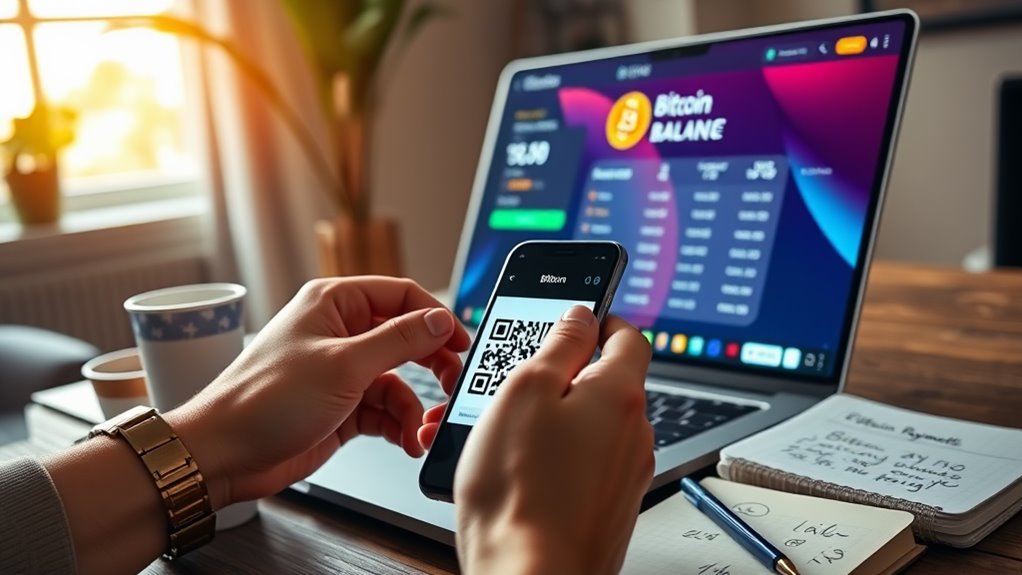
When making online payments with Bitcoin, the first step is to select it as the payment method during the checkout process.
After choosing Bitcoin, the user must confirm the transaction details to guarantee accuracy before proceeding.
This careful review helps prevent errors and guarantees a smooth transaction experience. Additionally, utilizing a crypto payment gateway can enhance security and streamline the transaction process.
Selecting Payment Method
How can individuals effectively make online payments using Bitcoin? Selecting the right payment method is essential for a smooth transaction experience. Users should consider the following factors:
- Merchant Selection: Confirm the retailer accepts Bitcoin as a payment option.
- Payment Transparency: Understand that all transactions are recorded on the blockchain for verification.
- Wallet Type: Choose a wallet that suits personal security needs, such as hardware or software wallets.
- Transaction Fees: Be aware that fees vary based on network load and transaction speed.
- Geographical Reach: Recognize that Bitcoin allows for global transactions without the need for traditional banking services. Additionally, using Bitcoin can lead to reduced transaction fees, making it a cost-effective choice for online payments.
Confirming Transaction Details
Confirming transaction details is an essential step for individuals making online payments with Bitcoin. Each payment is recorded on the blockchain, a public ledger that guarantees security through decentralized verification.
Transactions are pseudonymous, linked to wallet addresses rather than personal identities. Fees associated with transactions vary based on data size and network congestion, as miners require payment to process transactions. Additionally, understanding gas fees is crucial for optimizing transaction costs in cryptocurrency payments.
Generally, confirmations occur approximately every 10 minutes, with six confirmations often considered necessary for transaction finality. Users can track their transaction status in real-time using tools like Blockchain.info, which provide insights into confirmations.
Understanding these elements helps individuals navigate Bitcoin payments confidently and securely.
Utilizing BitPay for Seamless Payments
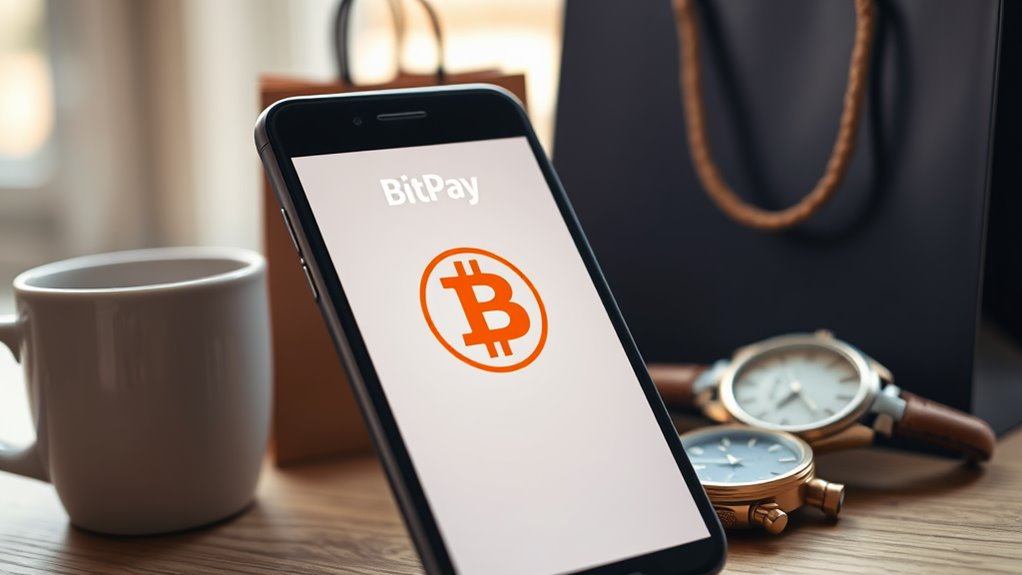
Utilizing BitPay for seamless payments offers a streamlined approach to handling Bitcoin transactions for both consumers and merchants. This payment processor simplifies the process, making it user-friendly and efficient.
Key features include:
- Wide Wallet Support: Over 100 cryptocurrency wallets are compatible with BitPay.
- Dynamic Pricing: Local currency prices are converted to Bitcoin at current exchange rates.
- Quick Invoice Generation: A payment invoice is created once BitPay is selected at checkout.
- Multiple Payment Methods: Users can scan QR codes or enter payment addresses manually.
- Compliance and Security: BitPay adheres to regulations, ensuring secure transactions. Furthermore, utilizing a crypto debit card can enhance your ability to spend Bitcoin seamlessly at various retailers.
Executing Peer-to-Peer Transactions

Peer-to-peer (P2P) transactions represent a fundamental aspect of Bitcoin’s functionality, allowing users to send and receive funds directly without the need for intermediaries. This decentralized approach enhances security and reduces transaction costs. Each transaction involves nodes interacting directly, where the sender specifies the recipient and amount of Bitcoin. Transactions are signed with a private key, ensuring authenticity. Once created, transactions are broadcast to the network for validation, allowing nodes to verify them independently.
| Feature | Description |
|---|---|
| Decentralization | No intermediaries involved |
| Security | Enhanced through cryptographic methods |
| Cost Efficiency | Lower fees compared to traditional systems |
This P2P structure increases financial inclusion and allows for faster, more efficient transactions.
Receiving Bitcoin Payments Effectively
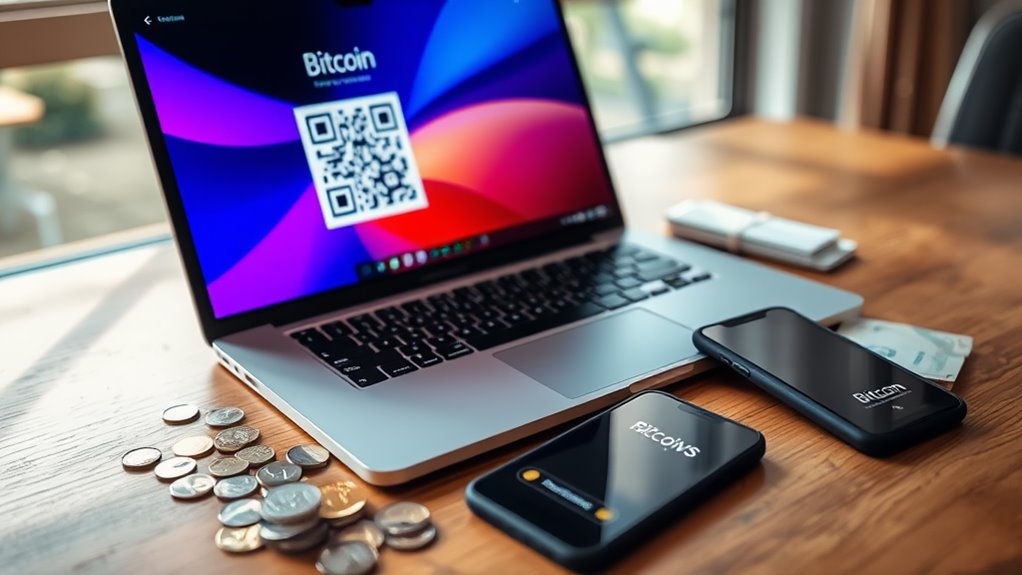
Receiving Bitcoin payments effectively requires careful consideration of various factors, including wallet selection, security measures, and transaction management.
To guarantee a smooth process, individuals and businesses should keep the following points in mind:
- Wallet Selection: Choose between hardware, software, or web wallets based on security needs.
- Account Creation: Set up an account by providing necessary information, like an email or phone number.
- Address Generation: Generate a unique Bitcoin address within the wallet for transactions.
- Security Measures: Implement strong passwords and enable two-factor authentication for added protection.
- Address Sharing: Share the Bitcoin address with the sender accurately to facilitate payments.
Managing and Tracking Bitcoin Payments

Effectively managing and tracking Bitcoin payments is a vital aspect for both individuals and businesses engaged in cryptocurrency transactions. Users can utilize blockchain explorers, such as Blockchain.com, to view transaction details through transaction IDs or public addresses.
While transaction information is publicly accessible, user identities remain pseudonymous unless disclosed. It is important to monitor transaction fees, which vary based on network congestion, influencing processing speed.
Transactions require multiple confirmations to guarantee security and reduce double-spend risks. Advanced tracking methods, including address clustering and behavioral pattern analysis, provide deeper insights into transaction networks.
However, privacy concerns exist, particularly when using exchanges that may compromise anonymity. Maintaining security through private key protection and secure wallet practices is essential for all Bitcoin users.
Frequently Asked Questions
Is Bitcoin Legal to Use for Payments in My Country?
The legality of Bitcoin for payments varies by country. In some regions, it is recognized as legal tender, while others classify it as a property or crypto-asset, subject to specific regulations and tax implications.
How Do I Calculate Bitcoin Transaction Fees?
To calculate Bitcoin transaction fees, one must consider the fee rate in satoshis per virtual byte, the transaction size in vBytes, and current network conditions, ensuring timely confirmation by adjusting fees as necessary.
What Happens if I Send Bitcoin to the Wrong Address?
When Bitcoin is sent to the wrong address, the transaction is irreversible. Funds may be lost permanently unless the address owner can be contacted, highlighting the critical importance of verifying recipient addresses before sending.
Can I Reverse a Bitcoin Transaction?
Reversing a Bitcoin transaction proves impossible; once confirmed, it stands immutable. Without recipient cooperation, funds remain inaccessible. Understanding this irreversibility emphasizes the need for caution, verification, and education before initiating any transaction.
How Do I Report Bitcoin Transactions for Tax Purposes?
To report Bitcoin transactions for tax purposes, individuals must utilize Form 8949 for sales and exchanges, Schedule D for capital gains, and Form 1040 for income. Accurate record-keeping is essential to guarantee compliance and avoid penalties.
Conclusion
In summary, utilizing Bitcoin for payments offers a modern approach to transactions, akin to steering a digital river with care and precision. By selecting the right wallet and understanding the acquisition process, individuals can confidently engage in both online and peer-to-peer payments. As users become familiar with tools like BitPay, the journey becomes seamless, enabling effective management of Bitcoin transactions. Embracing this cryptocurrency not only enhances financial flexibility but also stands as proof to the evolving landscape of commerce.


